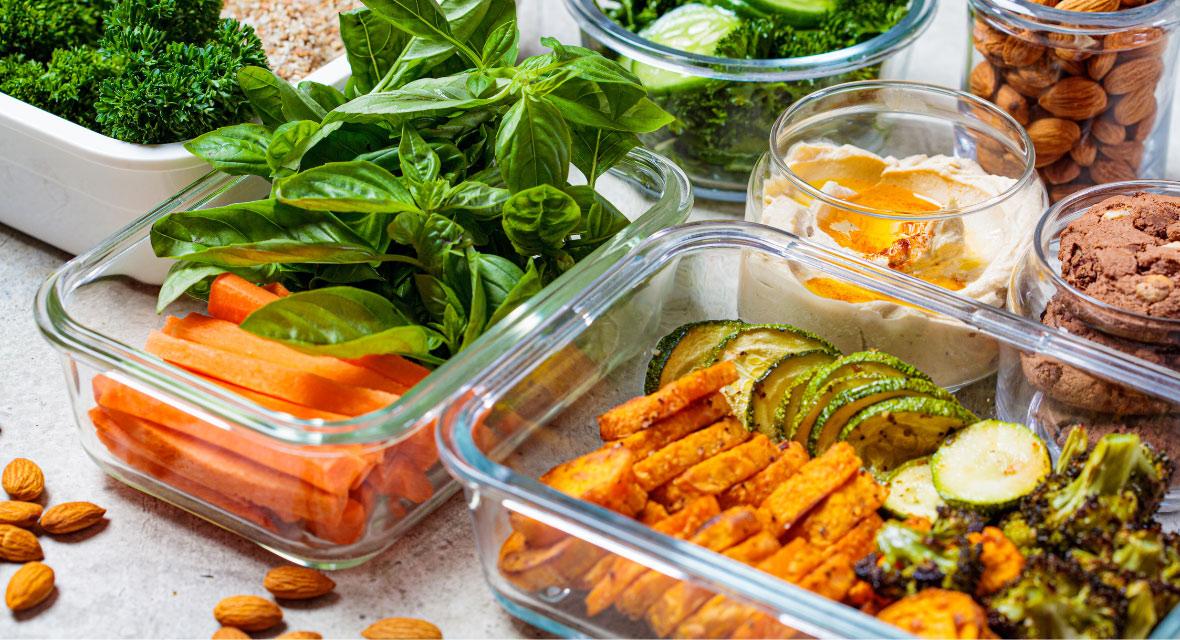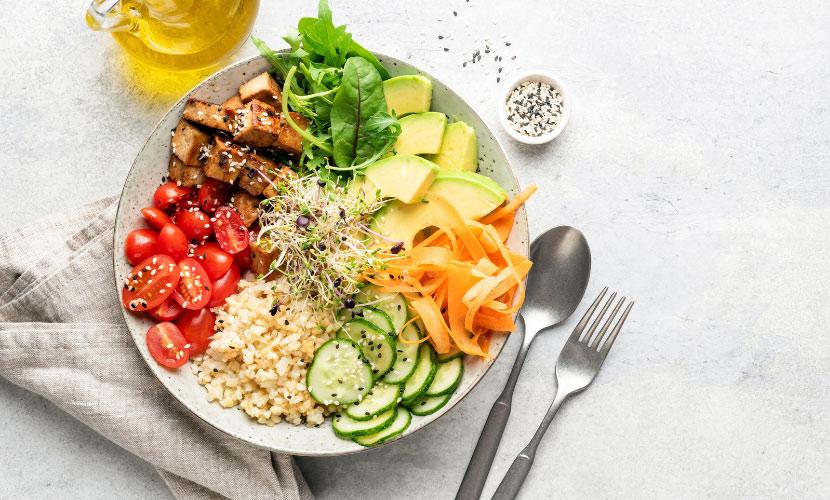🏆 As seen and loved on Shark Tank Dubai 🏆

Vegan Diet Pros and Cons
Pros and Cons of Going Vegan
Ever thought of how vegans manage their diet and what exactly a vegan diet comprises? Well, you need to dive into this article to know everything about a vegan diet plan.
A Vegan or plant-based diet plan excludes all animal products, including meat, dairy products, and eggs. Prohibiting animal exploitation is not the only reason to become vegan. For many people, having emotional ties to animals can be a prominent reason. Avoiding animal products is one of the most obvious ways to take a stand against animal abuse and animal victimization everywhere.
Well-planned vegetarian meal plans in Dubai comply with the rules for healthy eating and involve all the nutrition that our bodies need. Veganism is a great way of improving our diet and nutrition. Getting your nutrients from plant foods gives you more room for whole grains, fruit, nuts, seeds, and vegetables.
All these are full of beneficial fibers, vitamins, and minerals. From recycling our household garbage to cycling to work, we're all conscious about living a greener life. One of the most appropriate things an individual can do to reduce their carbon footprint is to avoid all animal products.
What is a vegan diet?
A vegan diet includes only plants (such as vegetables, grains, nuts, and fruits) and food made from plants. Vegetarians do not eat animal food, such as dairy products and eggs. Dietary vegetarians, also known as "strict vegetarians," do not consume meat, eggs, dairy products, or any other animal-derived substance.
An ethical vegan, also known as a "moral vegetarian," is someone who not only follows a vegetarian diet but broadens philosophy to other areas of their lives and condemns the use of animals for any reason. If you adhere to a non-dairy diet, you should say no to gelatin from animal bones and avoid your favorite cube of cheese. Your staples include fruits, vegetables, leafy greens, whole grains, nuts and seeds.
Foods highlighted in the vegetarian diet are rich in many nutrients such as vitamins A, C, E, and K, fiber, antioxidants, and phytonutrients. The impact of vegetarian diets on human wellness has been studied for many years now. Veganism has come a long way from its inception. But before you get on the no-meat, no-eggs, no-dairy bandwagon, ensure you understand what you're getting yourself into.
Key components of a balanced vegan diet
A balanced vegan diet encompasses various key components that provide essential nutrients for optimal health. These components include plant-based protein sources, whole grains, a variety of fruits and vegetables, healthy fats, and sources of important vitamins and minerals. Careful planning and attention to these elements ensure a well-rounded and nourishing diet.
Vegetables (Obviously) – If you love veggies, you will turn a hardcore vegan easily.
Tofu – There are a plethora of non-boring tofu recipes available. Sweeteners made from natural ingredients – Coconut sugar, maple syrup, and agave can sweeten your life. Remember, honey isn't allowed.
Legumes – Eat enough legumes as these will be your primary protein sources.
Nuts and seeds – Almonds, cashews, and plant seeds will become a go-to source of nutrients.
Fruits – Natural sweets know no bounds.
Grains – You can experiment with different bread, pasta, and rice types. Quinoa, freekeh, couscous, farro, and barley are some alternatives.
Benefits of Embracing a Vegan Lifestyle

Many people decide every year to go vegan, for good reason! There are several wonderful ways that a vegetarian diet can enrich our lives. The great positive effects of a vegetarian diet have been seen in the past. It puts less stress on our environment. Consuming a plant-based diet also ensures more effective use of our resources.
There are so many unusual reasons why one should embrace this lifestyle. A plant-based diet is one of the healthiest ways of living. Vegetarian diets must comprise plenty of fresh fruit and vegetables, whole grains, beans, legumes, nuts, and seeds. Vegan diets are generally high in vitamins, minerals, phytochemicals, and fiber. Healthy vegetarian diets are plentiful with vitamins B1, C, and E, folic acid, magnesium, and iron.
Plant-based diets are good for the body as they are low in cholesterol and saturated fats. If you are still pondering about being vegan, let us have a look at it:
High antioxidant content
Since vegetarian foods are constrained to plants, vegetables, fruits, beans, legumes, and whole grains, most of which can be consumed raw, you get high amounts of antioxidants. Vegetarian foods are not just excellent sources of antioxidants but also of vitamins and minerals.
Promotes weight loss
A limited diet allows you to drop a few pounds, which is excellent news for all those interested in weight loss. Cutting meat and high-fat cheese from your diet means you are consuming less saturated fats.
Non-dairy foods such as salads and fresh fruits are mostly low-calorie foods. It also means no more buttery desserts like traditional cakes and cookies. A vegan diet plan may be a good option if your doctor recommends losing weight.
Reduces the risk of cancer
It can reduce a person's risk of cancer by 15%. This beneficial effect may be related to plant food containing high levels of fiber, vitamins, and phytochemicals. Phytochemicals are actually bioactive compounds found in plants.
Many researchers say that the more phytochemicals you eat on a daily basis, the safer you are from the deadly cancer disease. However, research on the effects of a purely vegetarian diet on the cancer risk rate has yielded mixed results.
Develops self-control and mindful eating habits
If you're transforming from a non-vegetarian diet to a vegetarian one, it will require a lot of self-control and determination. These two factors are very important when it comes to becoming a vegetarian.
Being more aware of what you put into your body will hopefully deter you from overeating or eating a lot of processed food. Being extra conscious about where your food comes from, and its environmental or moral impact can also help you make more informed decisions.
Plants are more viable than meat
The meat and dairy industry has a significant impact on the environment. Natural forests and rainforests are being cut across the world for grazing cattle. According to the study, one pound of animal protein uses 100 times more water than one pound of grain protein.
With rising environmental concerns and the impact of animal agriculture on resources and climate change, choosing plant-based options reduces greenhouse gas emissions, conserves water, and helps preserve biodiversity.
Refusal to support this harmful industry can help the environment in multiple ways. It can also support local farmers who work hard to provide us with agricultural products. The cost of a non-dairy diet is also quite affordable.
Rich in fiber
Are you still wondering, "Can you be a healthy vegan?" Vegans consume more fiber than anyone whose plates have meats and cheeses. Well, this is because fiber is only present in plant-based foods like fruits and vegetables.
Our nutritionists suggest consuming between 25 and 38 grams of fiber. It is important for safe and fast digestion. Therefore, people who turn to a vegetarian diet experience improved digestion and bowel movements.
Limitations of a plant-based diet

There are also some downsides that you need to be aware of. Here are a few points on why plant-based diets are not suitable for everyone:
Not suitable for specific health conditions
Based on the current state of your health, your doctor may prevent you from taking a vegetarian or non-dairy diet. For example, if you have osteoporosis, a high intake of calcium is vital for the power and durability of your bones. Dairy is still the best natural source of calcium.
Binge-eating the wrong stuff
Newly proclaimed vegans are often stunned by how hungry they feel and are not sure how to maintain their diet or make up for the lack of calories. This tends to cause them to eat large quantities of high-fat foods.
This also includes processed snacks that look and sound healthy. After all, French fries are vegan! Nutritionists suggest a gradual shift to a non-dairy diet to allow yourself time to adjust and learn new habits and food items.
Limited food choices
The plant-based diet is often regarded as the most restrictive edition of a diet. Certainly, if you adopt this eating plan and eat a lot of non-vegetarian food, you can expect to remove most items from your typical weekly menu. For some people, this level of restriction is too intense.
Isolation of society
Friends, family, coworkers, and others can examine people's food choices. Although veganism is more normalized these days and plant-based foods are more widely available, you may still discover that you are quizzed and challenged about your rationale for selecting this lifestyle.
In addition, those who do not know how to handle your diet may remove you from social gatherings. Or worse, you may be invited and encouraged to eat foods that are not vegetarian-friendly.
Deficient in basic nutrients
Researchers say that one can experience weakness, exhaustion, constipation, and a loss of appetite if you don't get enough B-12. While fruits and vegetables are high in antioxidants, vitamins, and minerals, a few nutrients are difficult to obtain without animal products.
Calcium, omega-3 fatty acids, vitamin B-12, and folate are among them. The lack of these nutrients will cause bone and muscle loss if you don't supplement your diet with vitamin pills or fortified cereals.
Meal Plan Options
Healthy meal plans Dubai option offer a diverse range of delicious and nutritious plant-based meals. From breakfast to dinner, these diet meal plan Dubai provide a balanced combination of grains, legumes, fruits, vegetables, and plant-based proteins, catering to different tastes and dietary preferences while ensuring adequate nutrient intake.
Breakfast: A simple bowl of cereal or oatmeal (without any added butter or milk), fruit, nut, almond milk, coconut milk, and dry fruit smoothie.
Snacks: Basic mid-meal snacks include fresh fruit, vegetables, almond butter, hummus with whole-grain pretzels, pasta, and rice cakes.
Lunch: To add additional nutrients and hunger-fighting protein, add some beans. Grain bowls or a grilled "cheese" sandwich with soy cheese, tomato, arugula, and spicy red onion are two other fast choices. Veggies are a vegan's best friend, so a big salad is also a good option.
Dinner: Lentils, veggie rice or pasta with some seeds and tofu will keep your dinner interesting.
The After Thoughts
The popularity of plant-based diets is growing. A vegetarian diet can offer many health benefits, including improved heart health, weight loss, and a reduced risk of chronic diseases. Research also indicates that non-dairy diets are better for the environment.
Individuals who want to follow a non-dairy diet will have to plan their food carefully to make sure that they have enough key nutrients to avoid deficiencies. One size can never fit all, and ultimately the ideal diet for any individual depends on various factors.
Some factors can be age, fitness, overall health, and personal dietary preferences. Barring any major illnesses, such as diabetes or kidney problems, a vegan diet can certainly be beneficial for weight loss and health. But to ensure that you do it in the best possible way for your healthy living, you should certainly talk to our experts, as they will be happy to take you through a smooth transitional journey.
Reach out to start your fitness journey with us!
Meal Plans
Delivery Details
Legal Information
© 2020-2026 VMeals. All rights reserved. VMeals™ is a trademark of Flip Side Restaurant and Cafe L.L.C
We accept
